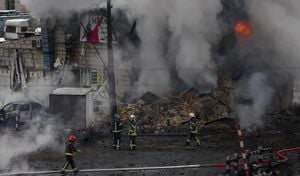After weeks of relentless hostilities, the ceasefire agreement between Israel and Hezbollah saw thousands of displaced Lebanese returning to their homes. The voices of the residents echoed feelings of uncertainty and determination, evaluated against the backdrop of widespread destruction and personal loss. Both sides had suffered significantly during the conflict, but the aftershock of the ceasefire has been met with different emotions among the Lebanese population.
Many families, who had sought refuge elsewhere, were newly energized with the promise of returning home, even if it was to the wreckage left behind by airstrikes. The situation was especially dire for those who found the streets they once knew transformed beyond recognition. Streets looked more like remnants of war zones than the neighborhoods they remembered. "The house has not collapsed but it is damaged," said Reem Hamoud, who described her emotional turmoil as she surveyed her beleaguered surroundings. "It’s not flattened but we cannot live inside. It needs a lot of work. Despite this, we are happy with what we did. This is only stone; we will build it again for the Seyyed and Imam Hussein," she affirmed with resilience.
Boosting spirits were visible along the highways from Beirut to areas like Sidon, Tyre, and the Bekaa Valley, where joyful townspeople secured mattresses and furniture on car roofs and scanned the skies with hopeful eyes. The rumbles of fighter jets had finally quieted, yet civilians remained wary, breathing the fresh air laced with uncertainty. Returning to neighborhoods once declared ghost towns, those who could sifted through debris, salvaging items they identified as usable. Actively engaged municipal workers started clearing streets and addressing damage to damaged electrical infrastructure, but fears lingered about Israel's aggressive history toward their region.
Communities, already riddled with challenges from the long-standing political and economic crises, faced another staggering hurdle. "It is only stone, and we will rebuild it again," reiterated Marina Nabulsi, who returned to her dry-cleaning shop to clear debris, breezing through destruction with begrudging acceptance. But underlying her acceptance was the pressing question of financial stability. Who would pay for this reconstruction? The World Bank recently estimated over $5.2 billion worth of damage across Lebanon attributed to the recent conflict, with over 99,000 homes damaged or destroyed and approximately 1.2 million people uprooted.
Many residents, including those living around Dahiyeh, expressed support for Hezbollah's narrative of conditional victory, viewing their resilience against destruction as triumph. "Don't look at the rubble. We are victorious because they did not take our weapons, and we are still here," said Issam Hijazi, whose shop was destroyed by airstrike collateral damage. The precarious balance between pride and devastation defined the mood among the people, who proclaimed their victories even as they faced the massive task of reorganization.
While some celebrated with Hezbollah flags proudly fluttering around them as symbols of their resistance, others felt the weight of anger toward the group for initiating the conflict. These sentiments, varying among the population, revealed just how complex attitudes were within this devastated community. Many, including individuals like Adnan Harake, openly expressed discontent with Hezbollah, blaming the group for provoking Israeli attacks. He reflected, "It's not only Israel killing us; all the Arab states, the US, and the Europeans were complicit during this struggle. They are all against the Shia, the only obstacle to creating their new Middle Eastern order."
"We didn’t start this to fight only Israel; we initiated opposition against the whole world,” he declared vehemently.
While joy mingled with despair among returning families, they confronted the reality of life scattered by war. Homes stood damaged, gardens lay erased, and where laughter once filled the air, now only silence and whispers of hope remained. Aid agencies noticed the shift as displaced persons began their journeys back, only to find uncertainty awaiting them alongside destroyed infrastructure. Schools and shelters remained open for refugees, as organizations coped with the outpouring of individuals now desperate to return.
The Lebanese Armed Forces assured residents of their collaboration with UN peacekeepers to fortify military redeployments around high-tension areas, particularly concerning movement south of the Litani River, where tensions with Israeli forces could flare up at any moment. The Israeli Defense Forces likewise communicated intentions to gradually withdraw from the area only after informing residents it was safe. The gradual withdrawal might not alleviate the fears of attacks, especially when armed presence remains so close.
According to World Bank reports, the preliminary outcomes of the conflict depicted on the ground echoed stark realities: at least 37 villages completely destroyed and hundreds of thousands left homeless. "This is our new reality, and we must face it... Many of us will struggle to survive from here on," reflected many returning residents, straddling the line between returning to life and treading dangerous waters with stark awareness of losses sustained.
The task of rebuilding would not merely be about reconstructing homes; it would dig far more deeply. It would necessitate community healing, combined financial strategies to revive the devastated economy, and collective action to navigate the dangerous political landscapes. With conflicting emotions hanging thickly around the air, from joy to sorrow and anger to victory, the communities grappled with their new normal. For many, every stone handpicked to reconstruct their homesteads symbolized resilience, tenacity, and hope for brighter days yet to come.



